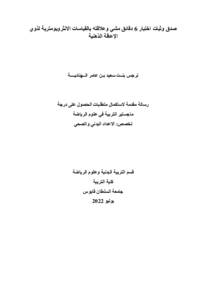Document
صدق وثبات اختبار 6 دقائق مشي وعلاقته بالقياسات الانثروبومترية لذو الإعاقة الذهنية.
Other titles
Reliability and Validity of Six Minutes Walking Test and its relationship with Anthropometric Measurements in children with intellectual disabilities
Publisher
جامعة السلطان قابوس.
Gregorian
2022
Language
Arabic
English abstract
The aims of the study were to examine the reliability and validity of six minutes
walking test (6MWT) in children with intellectual disabilities and to identify its
relationship with anthropometric measurements. 40 students with intellectual
disabilities (Age: 12.1±1.8 years, Height: 136.6±12.0m, Body Mass: 34.5±13.4
) participated in this study. All participants performed Kg, BMI: 18.0±4.9 kg/m2
6MWT twice at least one day apart to study its reliability. They also performed
Countermovement Jump (CMJ) and Free Countermovement Jump (FCMJ) to
examine their relationship to 6MWT. In order to study the Construct validity of
the 6MWT, the participants were divided into two groups according to their
degree of intellectual disability (simple disability = 21 and moderate disability =
19). Results demonstrated an acceptable reliability of the 6MWT through applied
statistical tools (Intraclass Correlation Coefficient= 0.857, Standard Error of
Measurement = 15.8m, Minimum Detectable Change= 43.8m, Limits of
Agreement = 112.9±16.1m). The area under the receiver operating characteristic
(ROC) curve was 0.742 which means that the test has the capacity to distinguish
between students with simple and moderate intellectual disability. Significant
correlations were recorded between 6MWT and both CMJ and FCMJ (r=0.484,
p=0.002; r= 0.417, p=0.007, respectively). On the other hand, no significant
correlation was observed between 6MWT and all the anthropometric
measurements. The findings of the current study indicate the reliability and
validity of 6MWT and the possibility of using it on a widespread level in the field
of the assessment of functional capacity of children with intellectual disabilities.
Member of
Resource URL
Arabic abstract
هدفت هذه الدراسة إلى التحقق من ثبات وصدق اختبار 6 دقائق مشي عند ذوي الاعاقة الذهنية، وتحديد طبيعة علاقته بالمعطيات الانثروبومترية. شارك في هذه الدراسة 40 طالبا من ذوي الاعاقة الذهنية )العمر1.8±12.1:سنة، الطول: 12.0±136.6م، كتلة الجسم: 13.4±34.5كغم، مؤشر كتلة الجسم: 4.9±18.0 كغم/م²(. للتحقق من الثبات أجرى كل المشاركون اختبار 6 دقائق مشي مرتين بفاصل يوم واحد على الاقل. كما قام المشاركون باختبارات الوثب العمودي المسبوق بالتمهيد مع أو بدون استعمال اليدين )CMJ وFCMJ، تباعا(. للتأكد من الصدق البنائي تم تقسيم العينة إلى مجموعتين حسب درجة الاعاقة )إعاقة بسيطة ن= 21 وإعاقة متوسطة ن= 19(. أظهرت نتائج الدراسة ثباتا مقبولا لاختبار 6 دقائق مشي من خلال مختلف الادوات الاحصائية المستعملة )معامل الثبات= ،0.857 الخطأ المعياري للقياس=15.797م، الحد الادنى من التغيير القابل لالكتشاف= 43.79 م، حدود التوافق= 112.9±16.1م(. بلغت المنطقة أسفل منحنى خصائص التشغيل )curve ROC )0.742 مما يدل على قدرة هذا الاختبار على التمييز بين ذوي الاعاقة البسيطة والمتوسطة. كما أظهرت نتائج الدراسة وجود علاقه ذات دلالة إحصائية بين اختبار6 دقائق مشي وقدرة كل من CMJ وFCMJ; ( 0.417=r0.007,=p 0.484=r0.002,=p، تباعا(. من ناحية أخرى لم يتم تسجيل علاقه ذات دلالة إحصائية بين اختبار6 دقائق مشي وجميع المعطيات الانثروبومترية. تشير نتائج الدراسة الحالية إلى صدق وثبات اختبار 6 دقائق مشي وإمكانية استعماله على صعيد واسع في مجال تقييم القدرة الوظيفية للمعاقين من قبل المهتمين بهذه الفئة من المجتمع.
Category
Theses and Dissertations

